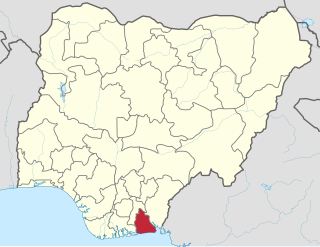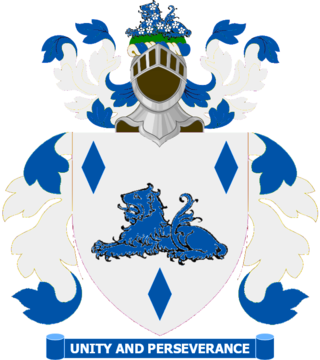
Akwa Ibom State is a state in the South-South geopolitical zone of Nigeria. It borders Cross River State to the east, Rivers State and Abia State to the west and north-west, and to the south by the Atlantic Ocean. The state takes its name from the Qua Iboe River which bisects the state before flowing into the Bight of Bonny. Akwa Ibom was split from Cross River State in 1987 with her capital Uyo and with 31 local government areas.

The Ibibio people are a coastal people in Southern Nigeria. They are mostly found in Akwa Ibom, Cross River, and the Eastern part of Abia State. During the colonial period in Nigeria, the Ibibio Union asked for recognition by the British as a sovereign nation.
Sir Charles Michael Dennis Byron is a former president of the Caribbean Court of Justice. He also serves as President of the Commonwealth Judicial Education Institute, and is former President of the International Criminal Tribunal for Rwanda (ICTR), and former Chief Justice of the Eastern Caribbean Supreme Court. He was born in Basseterre, Saint Kitts and Nevis.

Dr. Okoi Arikpo was a Nigerian chemist, anthropologist, lawyer, politician and diplomat. He served as the foreign minister of Nigeria.
Sir Allen Montgomery Lewis was a Saint Lucian barrister and public servant who twice served as the country's Governor-General.
Eket is one of the 31 local government areas in Akwa Ibom State, Nigeria. The name Eket or Ekid also refers to the indigenous people of the region who are the Ibibio people of the southern part of Ibibioland and to their dialect which is Ekid. The Eket people use the endonym Ekid for themselves and their language, but Europeans spell and pronounce the name as "Eket".

The Supreme Court of Uganda is the highest judicial organ in Uganda. It derives its powers from Article 130 of the 1995 Constitution. It is primarily an appellate court with original jurisdiction in only one type of case: a presidential election petition.
Benjamin Josses Odoki is a former Chief Justice of Uganda, former Supreme Court Justice of Eswatini, and current Chairman of the Committee of Constitutional Experts for Drafting the EAC Political Federation Constitution, the committee drafting the constitution for the East African Confederation. Odoki served as the tenth Chief Justice of Uganda from 2001 to 2013 after fifteen years as a Judge on the Supreme Court of Uganda. He was a State Attorney of Uganda previous to his appointment to the court in 1986.
Sir Louis Nwachukwu Mbanefo is noted as the first lawyer from the East of Nigeria. He was born in Onitsha, Eastern Nigeria, and obtained his education in the United Kingdom at a time when it was extremely rare to have a person of his ethnic persuasion pursuing higher education, much less professional training at the bar.

Ikot Abasi is located in the south west corner of Akwa Ibom State, Nigeria. It is bounded by Oruk Anam Local Government Area in the north, Mkpat Enin and Eastern Obolo Local Government Areas in the east and the Atlantic Ocean in the south. The Imo River forms the natural boundary in the west separating it from Rivers State. The Federal University of Technology Ikot Abasi is a federal government-owned university located in Ikot-Abasi.
The Methodist College of Uzuakoli is a college in Abia, Nigeria.
Udoma Udo Udoma is a commercial lawyer and founder of the Nigeria law firm Udo Udoma & Belo-Osagie. His career spans law, business and politics, as he served as a senator in the Federal Republic of Nigeria from 1999 to 2007, as a Federal Minister from 2015 to 2019, and on the boards of various corporations in both the private and public sectors.

Sir Alan Armstrong Huggins was a British colonial judge serving in places including Uganda, Hong Kong and Brunei. He spent nearly 40 years in the judiciary of Hong Kong, serving as a Vice-President of the Court of Appeal from 1980 to 1987. After the transfer of sovereignty over Hong Kong in 1997, he was appointed a non-permanent Hong Kong judge of the Court of Final Appeal until 2003.
Chief Atanda Fatai Williams, was a Nigerian Jurist and Chief Justice of Nigeria from 1979 to 1983.
Sir Alfred John Ainley was a British colonial judge, who served as Chief Justice of the Eastern Region of Nigeria, of Sarawak, North Borneo and Brunei, and of Kenya.
Ikot Udoma is a village in Eket Local Government Area of Akwa Ibom State, Nigeria. It is one of the villages under Abikpi (Ebikpi) sub-clan of Eket Offiong clan. It is bounded by Afia Nsit, Ofriyo and Odoro Enen villages to the north, Ikot Ibiok and Mkpok villages to the south, Idua Village to the west and Ata Idong Ikot Usoekong village to the east.
Ibanga Akpabio was a Nigerian educator and government official who was a regional Minister of Education and later of Internal Affairs in the Eastern region, during Nigeria's first republic.
Sir Samuel Okai Quarshie-Idun was a Ghanaian lawyer and judge. He worked as a lawyer in the Gold Coast from 1927 to 1936 and entered judicial service as a magistrate in 1936, rising through the ranks to become Chief Justice of the High Court of Western Nigeria in 1960 and President of the Court of Appeal for Eastern Africa in 1964.
Nyong Essien Akpan Efio-Iwat Effembe Ebit Akpan Amaide Oku was a traditional ruler, teacher, and retired civil servant in Nigeria.





